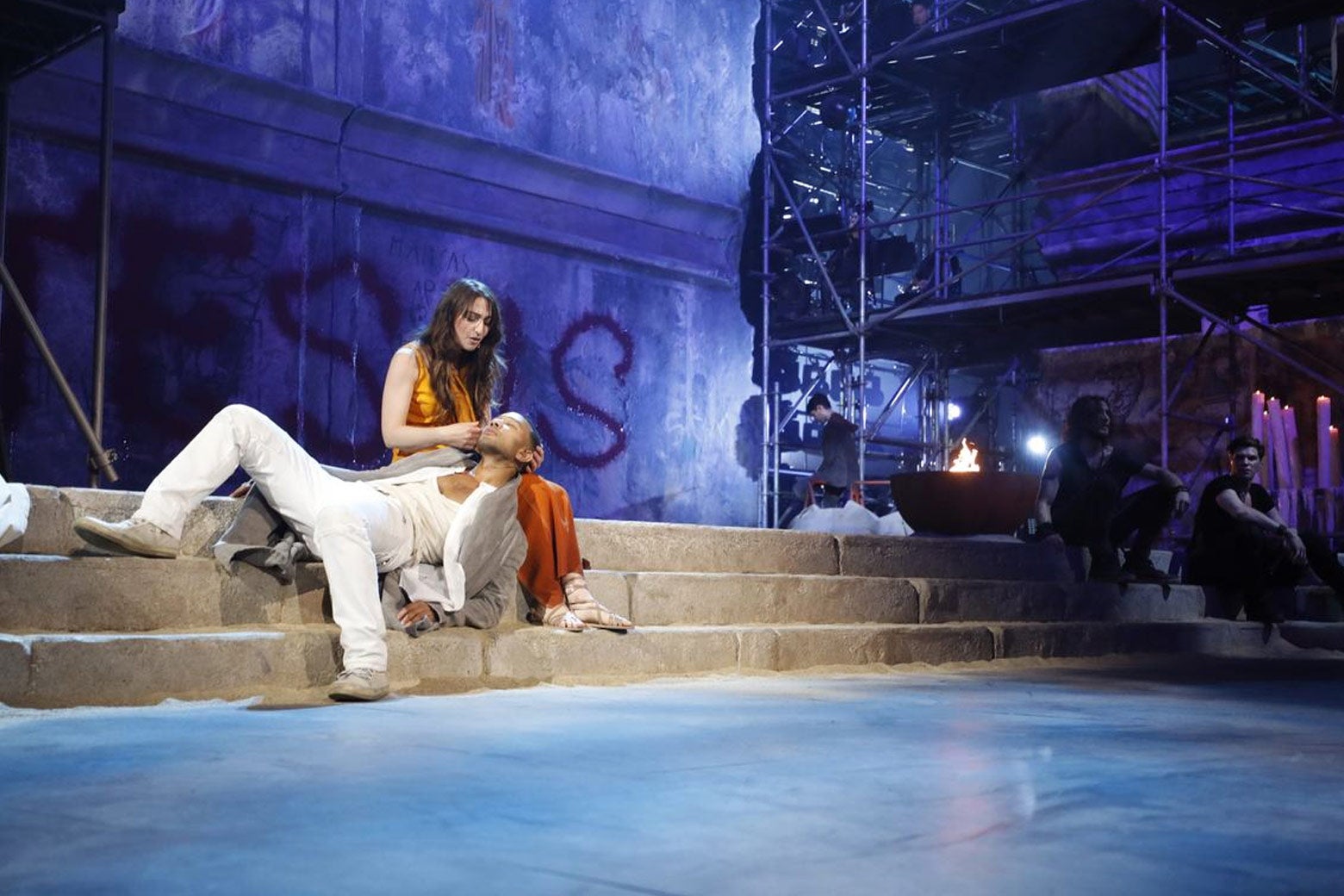When the ratings came in for Sunday’s Jesus Christ Superstar Live, it looked like pretty good news: 9.4 million viewers, higher than all but three of the previous “live musical” events since 2013’s The Sound of Music revived the genre. But with only a 1.7 rating in the key 18–49 demographic—NBC’s Hairspray, for one, drew fewer viewers but scored higher in the demo—the numbers also seem to suggest a question that may have been on many minds: Are the musicals of Andrew Lloyd Webber still relevant?
For years, the Lloyd Webber canon has been a bit of a cultural punching bag. It’s not hard to see why: His two most popular musicals are, respectively, a nearly plotless anthology sung by performers in spandex and fur and a faux opera about a disfigured stalker in pop culture’s most iconic mask (sincerest apologies to Ghostface and Jim Carrey). Cats, The Phantom of the Opera, and their ilk are the epitome of ’80s bombast: rock-tinged scores with daunting vocal ranges, mostly uncomplicated storytelling, and production values through the roof, all of which have allowed him to become a byword for over-the-top mediocrity that people can snub to feel cultured.
Jesus Christ Superstar Live, however, reminded audiences of a different side to Lloyd Webber’s canon: still colored with ’70s and ’80s rock, but with a much less cheesy feel. And it’s not the only one: Evita remains a thoughtful, if historically contested, portrait of a complex woman, while Sunset Boulevard is a musical theater classic that had a respectable revival last season. The composer’s most recent offering, School of Rock, is a bit more modern and filled to the brim with adorable, uber-talented kid actors. And the most ’80s of Lloyd Webber’s musicals, Starlight Express—yes, the one with roller-skating actors playing trains—has had a second life as the wacky-drug-trip musical of choice for many a musical theater major.
Even though many of us could probably go happily through life never hearing “Memory” again, the generally positive reception to JCS Live demonstrates that we may be in the middle of a potential redemption arc for the British megamusical maestro. The show wears its stylization brazenly but consistently, and takes the time to quiet down to allow the characters room to breathe.
The most laughable of Lloyd Webber’s musicals, the ones that pop culture has mercilessly skewered for decades, have a couple of things in common. They’re thinly plotted, ask us to sympathize with two-dimensional characters, and have weak lyrics. (Sorry, T.S. Eliot.) Cats is less of a story than a musical revue, a theatrical form that has been out of fashion for decades. Phantom, meanwhile, is understandably no longer seen as the epic romance as which it was once sold: In the age of #MeToo, it’s a stretch for audiences to swallow a murderous stalker as a romantic lead. And as far as its ill-conceived sequel, Love Never Dies—if you’re one of those folks who critiqued Harry Potter and the Cursed Child for sounding like goth-teen fan fic, you ain’t seen nothing yet.
By contrast, JCS showcases a side of Lloyd Webber that’s easier to take seriously, both musically and dramatically. Lloyd Webber can be quite a good composer, a fact that may come as a surprise to pop culture enthusiasts used to mocking Phantom’s synth-heavy, eardrum-bursting chromatic theme. But like many composers, he rises and falls on the strength of his lyricists, and Tim Rice is the only truly great collaborator he has had.
Rice’s lyrics are a huge part of why Evita and JCS have managed to stay relevant. An oft-praised highlight of NBC’s JCS broadcast was John Legend’s “Gethsemane,” in which Rice’s lyrics blend Biblical quotes with a modern, emotionally charged relatability. It’s these lyrics, not the rock music, that lets audiences connect to a literally divine protagonist:
I only want to say
If there is a way
Take this cup away from me
…
Then I was inspired
Now I’m sad and tired
Listen, surely I’ve exceeded expectations?
The musicals that endure also tend to be the ones that aren’t trapped by their own spectacle. It’s impossible to divorce Phantom and Cats from their grandiose original staging—remember that chandelier?—which tended to mask weaknesses in the story, where Evita, JCS, and Sunset have survived restagings and revivals, on stages and screens both large and small. Much of the snobbery surrounding Lloyd Webber’s shows pertains to their ridiculously elaborate physical productions, so separating the musicals themselves from their staging is helpful in revisiting their merit.
If we’re going to redeem Lloyd Webber’s musicals, then we have to talk about one of the biggest reasons they became a punchline in the first place: sheer oversaturation. Lloyd Webber opened 10 musicals in 14 years, from 1968’s Joseph and the Amazing Technicolor Dreamcoat through 1986’s Phantom. Several became long-runners, then staples at regional theaters; audiences couldn’t escape. Pair that with how seriously some of these shows took themselves, and you had a recipe for satire. Younger audiences in particular may be wary, knowing more about the parodies than the shows themselves, which perhaps was reflected in JCS Live’s ratings breakdown. Lloyd Webber is not the voice of the current generation, but he was a voice of a generation of theater, and that’s not something to dismiss.
In recent years, though, he’s kept a lower profile: Aside from updating The Wizard of Oz in the West End and School of Rock on Broadway, his presence has faded, making way for less epic, more contemporary musicals. Without an overwhelming presence that drowns everything else out, it’s easier to isolate his legitimate contributions to the musical theater canon. When character-centric works such as JCS take the spotlight, arguments for Lloyd Webber to be taken seriously suddenly hold more weight. It’s all a matter of balance—and how long it’s been since you last heard “Mr. Mistoffelees.”
